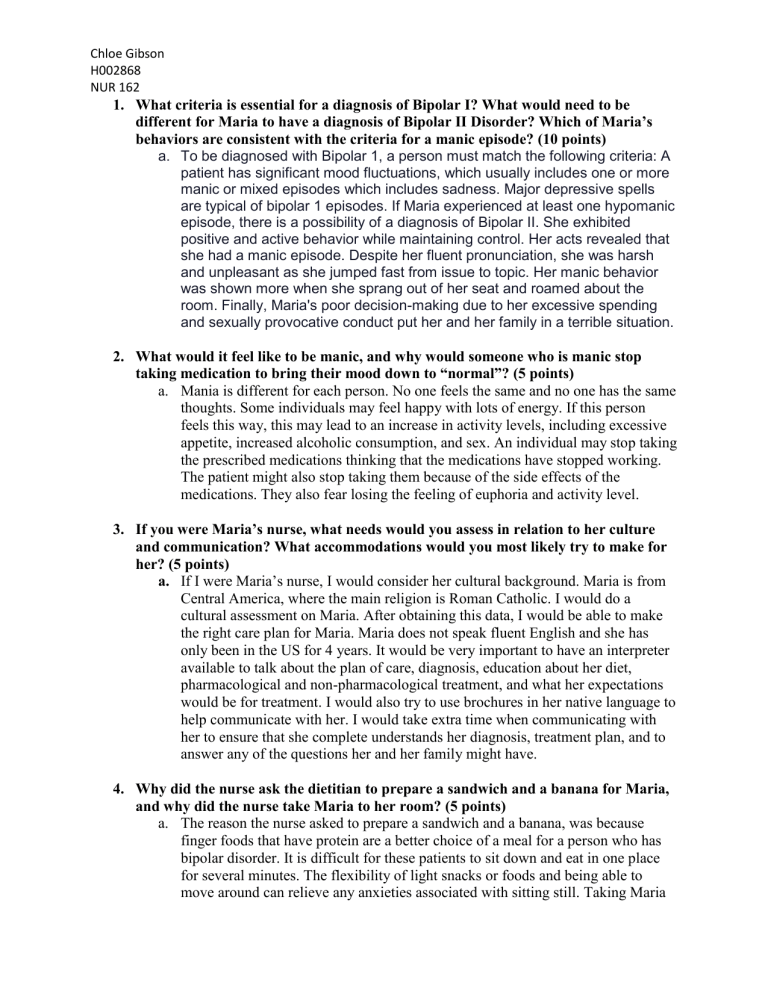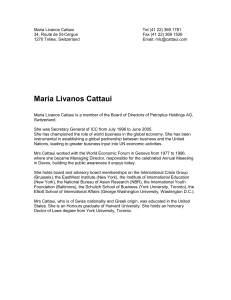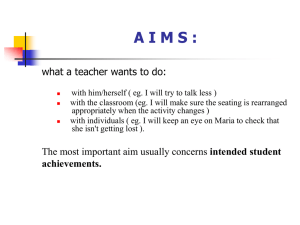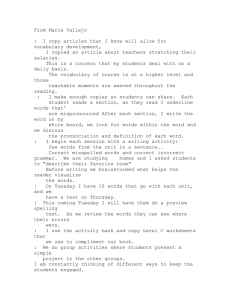Bipolar I Disorder Nursing Assignment: Diagnosis & Management
advertisement

Chloe Gibson H002868 NUR 162 1. What criteria is essential for a diagnosis of Bipolar I? What would need to be different for Maria to have a diagnosis of Bipolar II Disorder? Which of Maria’s behaviors are consistent with the criteria for a manic episode? (10 points) a. To be diagnosed with Bipolar 1, a person must match the following criteria: A patient has significant mood fluctuations, which usually includes one or more manic or mixed episodes which includes sadness. Major depressive spells are typical of bipolar 1 episodes. If Maria experienced at least one hypomanic episode, there is a possibility of a diagnosis of Bipolar II. She exhibited positive and active behavior while maintaining control. Her acts revealed that she had a manic episode. Despite her fluent pronunciation, she was harsh and unpleasant as she jumped fast from issue to topic. Her manic behavior was shown more when she sprang out of her seat and roamed about the room. Finally, Maria's poor decision-making due to her excessive spending and sexually provocative conduct put her and her family in a terrible situation. 2. What would it feel like to be manic, and why would someone who is manic stop taking medication to bring their mood down to “normal”? (5 points) a. Mania is different for each person. No one feels the same and no one has the same thoughts. Some individuals may feel happy with lots of energy. If this person feels this way, this may lead to an increase in activity levels, including excessive appetite, increased alcoholic consumption, and sex. An individual may stop taking the prescribed medications thinking that the medications have stopped working. The patient might also stop taking them because of the side effects of the medications. They also fear losing the feeling of euphoria and activity level. 3. If you were Maria’s nurse, what needs would you assess in relation to her culture and communication? What accommodations would you most likely try to make for her? (5 points) a. If I were Maria’s nurse, I would consider her cultural background. Maria is from Central America, where the main religion is Roman Catholic. I would do a cultural assessment on Maria. After obtaining this data, I would be able to make the right care plan for Maria. Maria does not speak fluent English and she has only been in the US for 4 years. It would be very important to have an interpreter available to talk about the plan of care, diagnosis, education about her diet, pharmacological and non-pharmacological treatment, and what her expectations would be for treatment. I would also try to use brochures in her native language to help communicate with her. I would take extra time when communicating with her to ensure that she complete understands her diagnosis, treatment plan, and to answer any of the questions her and her family might have. 4. Why did the nurse ask the dietitian to prepare a sandwich and a banana for Maria, and why did the nurse take Maria to her room? (5 points) a. The reason the nurse asked to prepare a sandwich and a banana, was because finger foods that have protein are a better choice of a meal for a person who has bipolar disorder. It is difficult for these patients to sit down and eat in one place for several minutes. The flexibility of light snacks or foods and being able to move around can relieve any anxieties associated with sitting still. Taking Maria Chloe Gibson H002868 NUR 162 to go to her room helped calm her down, which provided her with the comfort of familiar surroundings. Removing her from hostile or tense environments allowed for recovery of control and presented the opportunity for communication. 5. What is the most likely reason for the psychiatrist ordering a pregnancy test on admission? Why did he order birth control pills? The client has refused the birth control pills. How do you feel about this, and what action would you take if you were the nurse in this case? (15 points) a. The psychiatrist wanted to ensure that Maria is not already pregnant because her husband stated that she may be having sex with other men. The psychiatrist ordered birth control pills because he does not want her to get pregnant while in the hospital, due to the fact that she has been provocative and trying to have sex with other clients. Although Maria is catholic and her religion does not allow them to use any form of birth control, the psychiatrist did not ask Maria about her feelings about taking the medication. The psychiatrist should have never assumed about her believes and that it was okay to put a her on a birth control pill before discussing it with her and her family. If I was Maria’s nurse I would stress the importance of safe and controlled sexual activity, providing as much guidance and instruction as possible. I would make sure to monitor her behavior, while emphasizing on her sexual interactions with others. 6. What teaching did the nurse need to do about lithium for Maria? What is the significance of the lithium level, and what action(s) does the nurse need to take, if any? (10 points) a. The first thing I would do as Maria’s nurse would be to stress the importance of being compliant with the medication regimen. I would then monitor her weight daily and provide her with adequate nutrition while avoiding foods with high sodium content. This is important regarding the effectiveness of the medication, and how the body will react to the dosage. The therapeutic lithium level is 0.5-1.5 mEq/L. Maria’s lithium level is 1.5 mEq/L, which is an indication that Maria may be at risk for lithium toxicity. As her nurse, I would withhold the lithium and call the physician. After this, I would emphasize educating Maria’s husband to be aware of symptoms of lithium toxicity which are: nausea, vomiting, diarrhea, reduced coordination, drowsiness, slurred speech, and muscle weakness. If there are any of the slightest sign of these I would instruct her husband to contact emergency medical attention immediately. 7. What is olanzapine (Zyprexa), and what is the likely reason that Maria is being prescribed olanzapine? (5 points) a. Olanzapine is a second-generation antipsychotic used for psychosis episodes accompanied by delusions and hallucinations. Antipsychotics treat symptoms like: aggressive or disruptive behaviors, anxiety, and insomnia. In this case, Maria has not been eating or sleeping and is refusing to take her medications. Her behaviors show concern. Short temper and aggressive actions are triggers that should be watched very closely. Some signs which would be reasons for her to take this medicine would be her not sitting down to eat, the provocative dress, and Chloe Gibson H002868 NUR 162 asking men for sexual favors. Her behaviors will trigger others around her to act in a negative manner. All of these behaviors she is exhibiting are risky and dangerous. Olanzapine has fewer side effects than the first-generation drugs and eliminates the target symptoms safely, which makes this drug a better choice of medication for Maria. 8. What strategies could a nurse use when Maria is demanding that a staff member be sent to shop for her using her credit card? Do strategies differ depending on whether the client has supportive family and/or friends, or not? (10 points) a. My strategy as her nurse would be to provide a stable and structured environment. I would also set limits on Maria’s behavior that could influence others, and I would be clear and concise of what expectations I have of her, and what she should expect from me. I would take extra precautions and care when communicating these expectations to her, given Marias level of manic temperament, as well as her language barrier. I would use short and simple sentences and observe her body language and clues to ensure that she understands. I would use these rules to maintain her safety, and the safety of those around her. Using these would also help establish a comforting routine she will agree with. Maria will know that demanding the staff will not be permitted or tolerated, setting these limits will help her understand what is expected of her. Setting these expectations should be done immediately after admission. Patients in a state of a mania act very impulsively and at times are very demanding, so using this type of strategy will reinforce the treatment goals, and put to rest any uncertainty. The perception of inconsistency may produce disrespect and undermine the process. So, using a simple, clear and calm process, with precise expectations and goals, will be a stabilizing foundation that all treatment will rely on, and even more important would be its simplicity and functionality for all those close to Maria can fall back upon. 9. When the nurse finds Maria has been intrusive with another client and that both clients are escalating and threatening, what is the best response by the nurse? (5 points) a. De-escalation is the critical point following such incidents. Immediately removing both parties is equally important as not casting blame. Then the following moments will be the most important within the situation. Controlled conversation, without condescending phrases or buzzwords will be most effective. Allowing the frustrations and aggression levels to slowly dissipate before examining the root cause of the incident should be discussed. Aggressive behavior between Maria and the other patient s should be treated with extreme caution. Maria needs to be aware how this behavior is not only unacceptable, but how it will not help her in anyway. My role as the nurse is to alleviate these types of behaviors through constructive and constant monitoring of the mental state of her as well as the effect that the immediate surroundings may have on her. Removing the distractions and non-essential triggers would be the most difficult task as a nurse. I would use the help of the structured and consistent care plan to build effective Chloe Gibson H002868 NUR 162 foundations of care. Utilizing this will help control the bad behavior and limit interactions which might turn volatile. 10. Write 3 nursing diagnoses for this client? (Please write the nursing diagnosis correctly). For each nursing diagnosis, please write 4 nursing interventions. (30 points – Each nursing diagnosis with 4 interventions is worth 10 points each) a. Imbalanced nutrition: less than body requirements related to excessive physical agitation secondary to bipolar disorder. i. Nursing interventions: 1. Provide finger foods instead of large, sit down meals. 2. Encourage family members to bring food from home to the hospital that the patient likes. 3. Offer high protein supplements based on individual needs and capabilities. 4. Provide good oral hygiene. b. Knowledge deficiency related to medication regimen as evidence by noncompliance of taking daily medication for bipolar disorder. i. Nursing interventions: 1. Provide clear and understandable explanations about the importance of medication compliance. 2. Include the patient in creating teaching plan. Include creating objectives and goals that the patient will comply with. 3. Help the patient integrate medication regimen into their daily life. 4. Allow the patient to repeat the information about the medication compliance and ask questions she might have. c. Ineffective coping due to inappropriate behavior and language. i. Nursing interventions: 1. Meet physiologic needs the patient is lacking. 2. Promote and encourage appropriate behaviors 3. Provide a safe and calm environment. 4. Provide therapeutic communication between the nurse and patient and caregivers.


